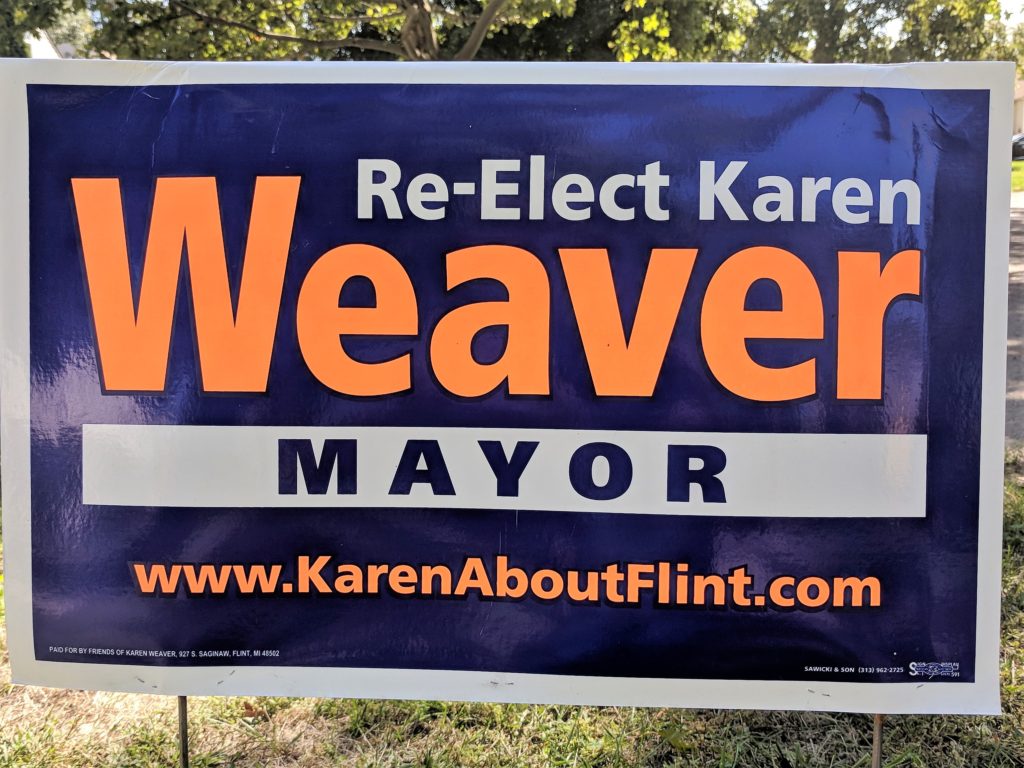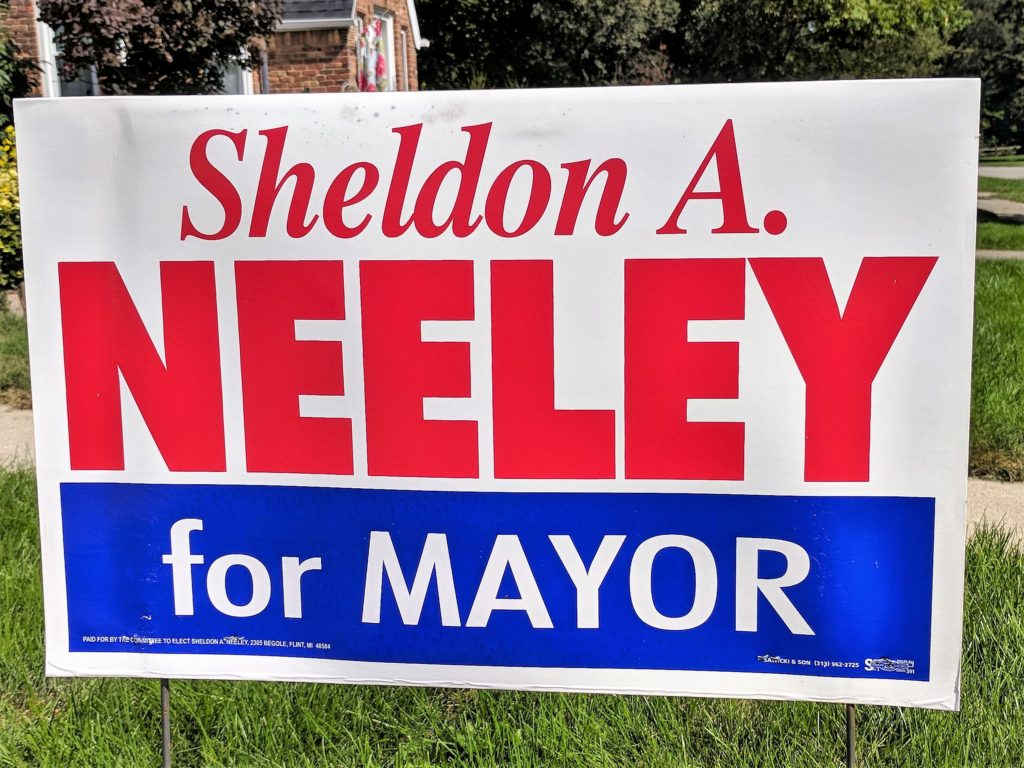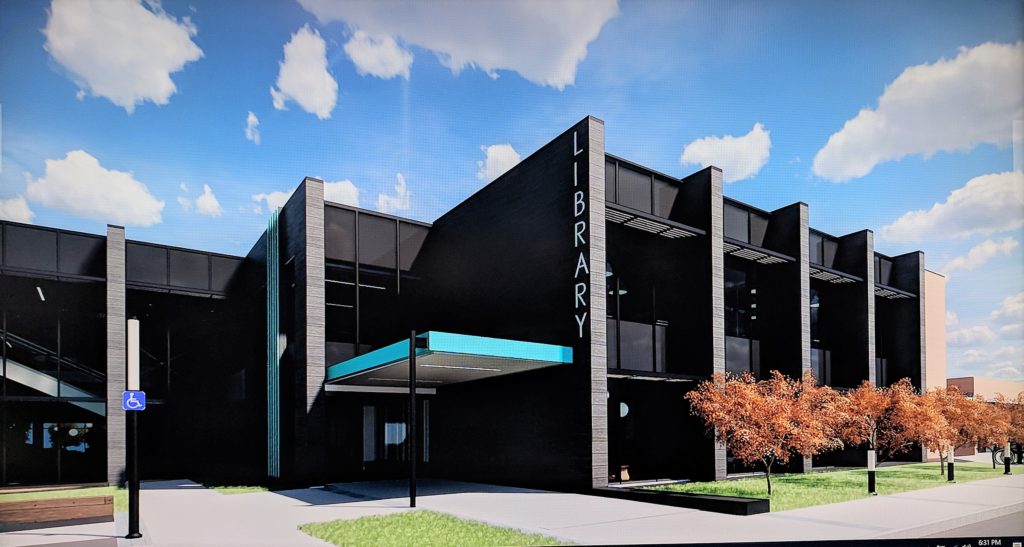By Paul Rozycki
The campaign signs are popping up. The campaign flyers are in the mail. TV and social media ads are sure to be seen soon. The Flint mayoral campaign is underway.
In less than a month Flint voters will elect their next mayor—the first general election under the new charter. But the big questions is—How much do Flint voters care? In the August primary only 12 percent of the voters turned out to give Mayor Karen Weaver and Rep. Sheldon Neeley the right to move on to the Nov. 5 election.
Interviews with each of the candidates have been posted here (Weaver) and here.(Neeley)
How many more voters will show up next month? Genesee County Clerk John Gleason, a close observer of local elections, suggests that turnout might be as low as 20 percent for the general election—perhaps 15,000 to 17,000 votes total. That’s a typical turnout for a primary, but a dismal showing for a general election.
Though Flint has had a history of low turnout elections in recent years, this one is different in several ways. Because it’s the first one under the new charter, the mayor will serve only three years, until 2022, rather than the usual four-year term. After 2022, the mayor will be elected every four years, in the same year as the governor. The hope is that turnout will improve by holding the mayor’s contest at the same time as the election for governor and state lawmakers.
But this election is different in one other way as well. It’s the first time that two African American candidates have faced off for Flint’s top job. Over the last forty years it has been common to have one white candidate and one African American candidate running for mayor. And voters often divided along racial lines. However, having two African American candidates hasn’t stopped race from being a factor in this campaign and it hasn’t prevented negative campaigning.
The primary election was close. Weaver won 42 percent of the vote. Neeley got 39 percent. Pfeiffer won 13 percent and Eason got five percent. Where will those who voted for Greg Eason and Don Pfeiffer go?
With less than a month to go, the outcome of the election is up in the air, and good case can be made for either a Weaver or Neeley victory.
Why Weaver could win

On Mayor Karen Weaver’s side there are a number of good reasons why she could win another term.
As the incumbent, she has built up strong name recognition and community visibility.
During her first term, the state takeover of Flint ended.
She has raised substantial campaign funds—over a quarter of a million dollars early in the year.
She has brought national attention to the Flint water crisis with numerous celebrity visits, and national media stories. Offers of financial help often followed.
While there has been controversy over the pipe replacement in Flint, the process is moving along, and by one estimate, may be done by the end of the year.
Her supporters include some of the major players in Flint politics, who know the system well.
She has proven herself to be a competitive campaigner—winning her first election over Dayne Walling in 2015, and then turning back a recall attempt in 2017, with a majority of the vote.
Why Neeley could win

On the other side, Rep. Sheldon Neeley can also make a strong case for victory.
He has substantial governmental and political experience. He served on the city council for nine years, and is completing his third term as state Representative from the 34th District. He won easily in a district that includes much of the City of Flint.
Over his political career he has made community outreach a major focus. He has hosted numerous events, forums, and workshops for a variety of causes, within his district and beyond.
As a member of the legislature, he was elected chair of the Black Caucus by other lawmakers.
When people are angry, those who challenge incumbents often have an advantage.
Charges have been raised, from Neeley’s campaign and others, about unfair use of absentee ballots, and a “pay for play” atmosphere in city hall, with questions about who gets city contracts.
To be sure, it’s an unusual election, but both candidates are campaigning full blast as they try to mobilize their voters and get their message out.
An important election for the city
It may be an unusual election but it’s an important one. The city is facing major decisions in the next few years. Will the water crisis finally be resolved? How will we move beyond the water crisis and restore trust in the system? What is the next step in Flint’s rebirth? Will the city be able to make a smooth transition as it begins to implement the new charter? Will there be an ombudsperson on duty in the near future? How will the mayor work with a contentious and divided city council?
All of those are important challenges and the voters’ voice should be heard.
Flint Public Library millage and bond issue

Proposed new entrance to the Flint Public Library
For all the attention that is devoted to the mayoral campaigns, that’s not the only thing on the ballot. In Flint, voters will have the opportunity to vote for both an operating millage renewal, and a 12-year, $12.6 million bond issue, to fund a major renovation of the Flint Public Library. If the bond issue passes, the average home in Flint would see a $27 increase in property taxes. Donors are providing more than half of the cost of the $27.6 million project.
The library is offering a series of open houses to inform the public about the plans for the renovated Flint Public Library. They are open to the public, and they are scheduled for Oct. 1, from 6 to 7:30 p.m. and Oct. 29, from 1 to 2:30 p.m. and 6 to 7:30 p.m. More information is also available at www.YourNewFPL.org.
Elections outside of Flint
For all the attention that it gets, Flint’s election isn’t the only one this year. In the out-county, voters in Davison, Gaines, and Grand Blanc Townships are facing public safety millages.
Several school districts in the county also have millages or bond issues on the ballot. They include Birch Run, Fenton Area, Lake Fenton, Atherton and Lakeville schools.
Clio voters will have the opportunity to vote on four separate updates to their city charter.
Voters in Burton, Flushing, Fenton and Grand Blanc will also be choosing their mayors, and voters in Clio, Burton, Flushing, Fenton and Grand Blanc will be electing council members. Grand Blanc voters will also be electing two members to the city’s board of review.
Get out and vote!
This may be a low profile election, it may involve only parts of the county, and there may not be a lot of media coverage compared to a presidential or a gubernatorial election, but it’s still important.

Paul Rozycki (Photo by Nancy Rozycki)
Local elections do matter. As a result of last year’s ballot proposal, voting is easier than ever. Any voter can vote absentee, without giving a reason. Information on the new voting rules is available from the city or county clerk’s office or the League of Women Voters at www.VOTE411.org.
Be sure to get out and vote.
EVM political commentator and staff writer Paul Rozycki can be reached at paul.rozycki@mcc.edu.


You must be logged in to post a comment.